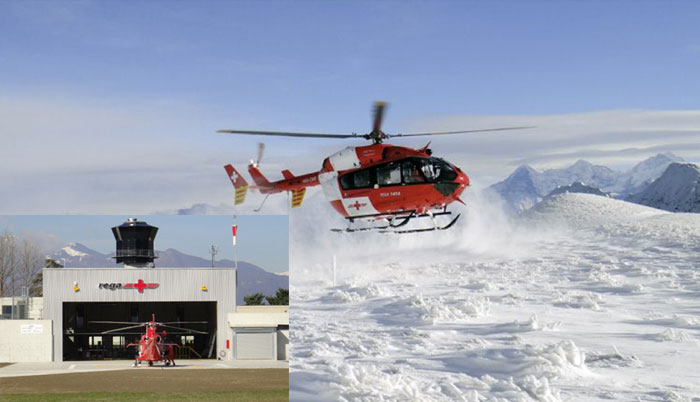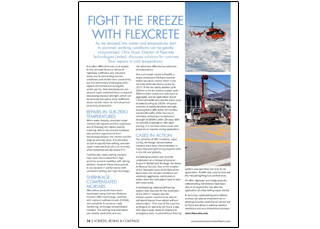The November issue of Tomorrow’s Contract Floors explores the issue of carrying out concrete floor repairs in sub-zero temperatures. In particular, it takes a look at the solution offered by Flexcrete’s Fastfill, which can be rapidly applied and cures normally at temperatures as low as -10°C…
It is often difficult to carry out repairs to the concrete floors or decks of highways, trafficked and industrial areas due to demanding service conditions and limited time constraints, but it is particularly challenging when repairs are carried out during the winter period. Cold temperatures can prevent repair materials from curing and developing physical strength, which can be severely disruptive when trafficked areas need to return to normal service as quickly as possible.
Looking for Weatherproof Products?
If you are looking for Weatherproof products for your next repair project, get in touch with Flexcrete.
Repairs in Sub-Zero Temperatures
When water freezes, standard repair mortars will expand and this expansion due to freezing can rapidly lead to cracking. Wet or ice-covered surfaces also prevent a good bond from developing between the mortar and the original concrete deck. It is therefore crucial to specify fast setting concrete repair materials that will cure normally when temperatures dip below 0°C. Traditionally, rapid-setting mortars have been formulated from high alumina cement modified with strong alkalies, however these have proven to be variable in performance with unreliable setting and high shrinkage.
Shrinkage Compensated Mortars
Alternative products have been developed using Ordinary Portland Cement (OPC) technology modified with calcium sulfoaluminate (C4A3S) and anhydrite to produce rapid hardening, shrinkage compensated mortars. The setting characteristics are reliably controlled and are not adversely affected by extremes of temperature. One such repair mortar is Fastfill, a single component Portland-cement based structural mortar which cures normally at temperatures as low as -10°C. It can be rapidly applied up to 100mm or for full section repairs up to 300mm when bulked out with sand or aggregate, and an application of just 7.5mm of Fastfill provides the same level of waterproofing as 1000m of typical concrete. It rapidly develops strength, allowing foot traffic within 45 minutes and forklift traffic within two hours, ultimately achieving a compressive strength of 60MPa within 28 days. With no need for substrate or inter-layer priming, it is non-toxic when cured and presents no hazards during application.
Cases in Action
The benefits of OPC modified, rapid curing, shrinkage compensated mortars have been demonstrated in many demanding flooring projects both in the UK and globally. A challenging project was recently undertaken on a helipad at Locarno Airport in Switzerland for Rega, the Swiss Air-Rescue Service. Due to the location of the helicopter base at the foot of the Swiss Alps, the climatic conditions are extremely aggressive, particularly in winter when the helicopters have to land with snow skids. A hardwearing, waterproof flooring system was required for the protection of the 450m2 helipad and the chosen system needed to be able to withstand freeze/thaw attack without deterioration. Time was of the essence as Rega is on stand-by 24 hours a day, 365 days a year, ready to respond to emergency calls. A cementitious flooring system was specified but prior to its application, Fastfill was used to help set the helipad lighting to a perfect level. On other highways and bridge projects, waterproofing membranes have been able to be applied the day after the application of a fast setting repair mortar.
In summary, rapid-setting cementitious mortars can play an important role in allowing concrete repairs to be carried out to floors and decks in extreme weather conditions and very limited time windows.
To download the full article, please click on the button below:



